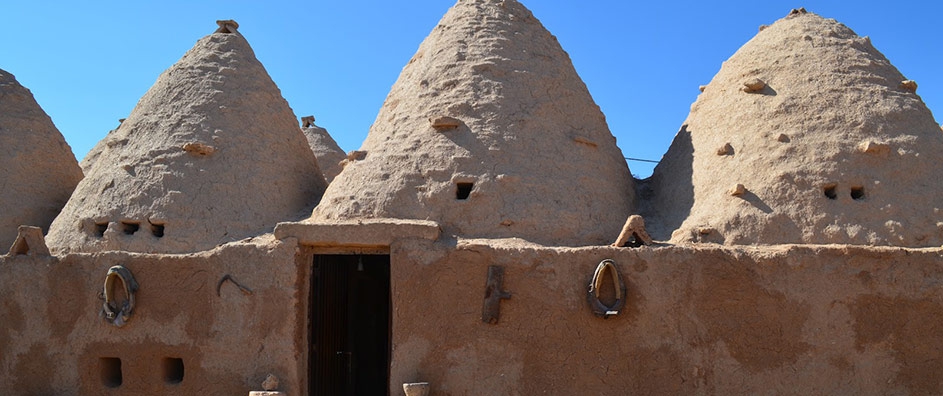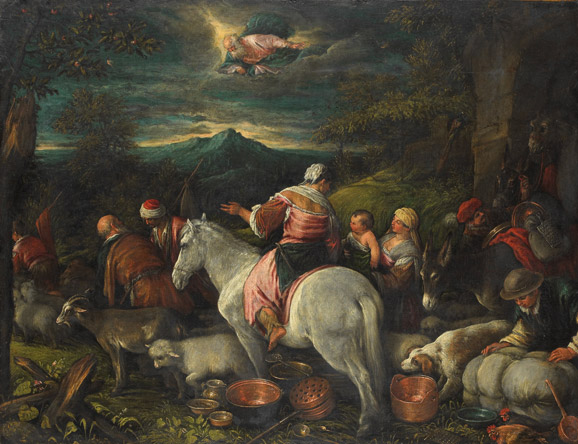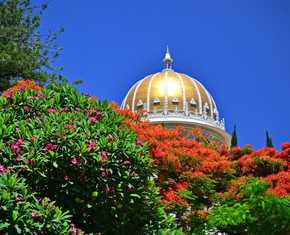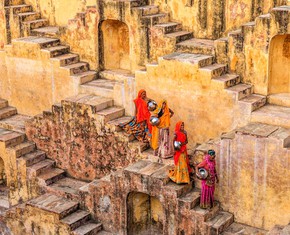The views expressed in our content reflect individual perspectives and do not represent the authoritative views of the Baha'i Faith.
…and he died in Haran. – Genesis 11:32.
Abraham, sent into exile for teaching his new, monotheistic Faith, went to a place named Harran.
When Abraham, Sarah, Terah, and Lot reached Harran, they would have seen a cluster of houses constructed of sun-dried brick and shaped like old-fashioned beehives, a type of construction that had been popular for at least ten thousand years.
Although the town of Harran was not, in 2000 BC, the extensive and cosmopolitan city it would eventually become, its people were already deeply involved in worshipping a moon god who had the memorable name of Sin. The veneration of Sin actually continued for centuries, surviving the influences of succeeding waves of conquerors. Various groups of Mesopotamians—Akkadians, Babylonians, and Assyrians—took turns occupying the city of Harran until it passed into Persian rule when the Medes (Iranians) conquered the area in the sixth century BC. After that, control of the city bounced back and forth among the Persians, the Greeks, and the Romans.
The town’s devotion to Sin remained and flourished from generation to generation and century to century, thanks in large part to the way that both priests and believers were willing to adopt new ideas and images from conquering rulers without actually converting.
For instance, they adopted the goddess Ningal from Ur, but then they married her to Sin and put her in a separate temple. When the Zoroastrian Persians took power, Sin’s adherents accepted the idea of ethical dualism (the battle between good and evil) from Zoroastrianism and wove it into their own view of the cosmos. These stalwart worshippers may even have borrowed a few things from Hinduism, for old records indicated that the inhabitants of Harran somehow obtained an “Idol of the Water” from India and mounted it in a special temple to the east of the city.
Christian missionaries made some converts among the citizens of Harran in the years following Jesus’ death and constructed a sturdy basilica, but again, most of the local power continued to be held by priests at the temple of Sin. The greatest threat to the continuation of the cult of the moon god came in the ninth century AD, when an invading Muslim army gave residents a choice of conversion or death. According to one account, the priests of Sin placated the invaders by appropriating for themselves the Qur’anic label of Sabians (or Sabeans) mentioned by Muhammad as acceptable believers in God, while simultaneously praying for the destruction of the mosque and continuing to worship Sin.
Harran’s strength and religious dedication continued until AD 1000 or so, when the flow from underground aquifers lessened, probably due to increased irrigation of farms, orchards, and gardens in the broad Jullab-Balikh valley. After Mongol raiders sacked Harran in 1259, the upstream town of Urfa underwent a growth spurt and diverted ever greater amounts of the valley’s water for its own use. In time, the Jullab River, on which Harran had depended, shriveled into an insignificant arroyo, flowing only during rainstorms, and the formerly sweet wells of the city of the moon god degenerated into brackish sinkholes. When Lawrence of Arabia visited the ruins of Harran in 1911, dining on cucumbers, bread, and mulberries with the local sheikh, the water he drank had to be hauled from a well that lay a mile away.
The reliable well from which Lawrence’s water came was named, according to his diary, after Rebekah, who lived in Harran as a girl and drew water from the well before moving to Canaan and marrying one of Abraham’s sons. Bafflingly, forty years after Lawrence’s visit, what had been Rebekah’s Well was being referred to as Jacob’s Well (Bi’rYa’qub), honoring Rebekah’s son, Jacob, in spite of the fact that Jacob never lived in Harran.
All in all, ancient Harran was not a town from which a reviled monotheistic prophet could expect an enthusiastic welcome. Still, one gathers from tradition that Abraham and Sarah tried to make the best of their new environment. They raised flocks of sheep while living in a mud brick house situated on a gentle hill.
At first, Abraham did not mention his beliefs to anyone. He maintained this silence until rumors about the way he had confronted King Nimrod reached the ears of local Harranians. The rumors aroused so much curiosity that the townspeople began seeking Abraham out to ask questions. Then and only then did Abraham break his silence and try to convey the truth of monotheism to them. In deference to the customs of the time, Abraham spoke only to men, while Sarah accepted the responsibility of speaking with any of the women who wanted to learn more.
The general reaction to Abraham’s teachings was negative. The Baha’i writings explain:
These people believed not in one God but in many gods, to whom they ascribed miracles, therefore, they all arose against Him, and no one supported Him except Lot, His brother’s son, and one or two other people… – Abdu’l-Baha, Some Answered Questions, p. 12.

















Comments
Sign in or create an account
Continue with Googleor